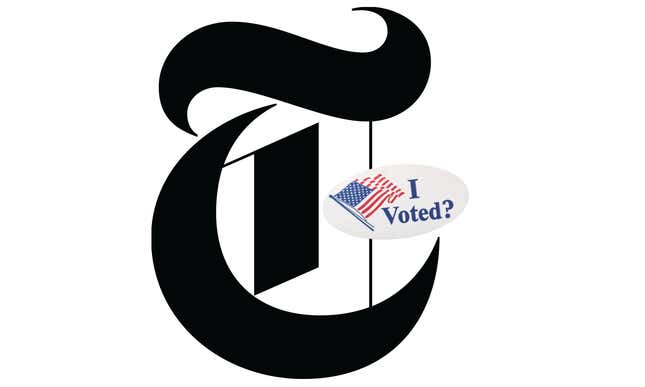
Like many major news organizations, the New York Times has a policy that forbids its writers and editors from publicly endorsing any candidate. Ancient journalism folklore states that ideally one shouldn’t have opinions—doing so would anger our one true god, Objectivity—but given that this isn’t possible, it’s instead advised that one simply not express them.
Of course, no one buys that Times reporters don’t have opinions, or really finds it hard to discern what those opinions likely are. That’s especially true in this election, what with Donald Trump calling the Times out by name from the stump, saying the paper’s stories are a “total lie,” while eagerly painting the media as one part of a sinister Jew-run cabal.
The Times thus had a calculation to make—one it makes every election but which seemed particularly pressing this year. It could ask its reporters to pretend they don’t want Donald Trump to lose—to lie, essentially—or allow them to honestly voice their opinions and let the chips fall where they may, knowing that a large portion of America views them as hostile actors regardless. Obviously, the paper chose the first option (we chose the second), with its reasoning for doing so being laid out in a memo circulated to staff by associate managing editor for standards Phil Corbett, and reprinted by the paper’s public editor Liz Spayd. Corbett not only instructed his reporters and editors to not endorse a candidate, but went a step further by asking them to make sure their social media accounts “reflect[ed] a diverse collection of viewpoints.” The memo reads in part:
On personal social-media accounts, Times newsroom staffers should avoid editorializing, endorsing candidates or otherwise promoting their own political views.
This applies to every newsroom journalist in every department. Even if you personally are not involved in coverage of politics, our colleagues are working hard to maintain The Times’s reputation for credibility and fairness, and we should not do anything to make their jobs tougher.
While you may think of your Facebook page or other social-media platforms as a private area completely separate from your Times role, in fact everything we post online is to some degree public — and everything we do in public is likely to be associated with The Times.
If you are linking to other sources, aim to reflect a diverse collection of viewpoints. Sharing a range of news, opinions or satire from others is usually fine. But consistently linking only to one side of a debate can leave the impression that you, too, are taking sides.
I asked Bill Keller, who ran the Times for nine years, whether the specific nature of this election, featuring not only a historically vile candidate but one who made attacking the Times a pillar of his campaign, could have meant that Times reporters didn’t have to perform this silly little ritual dance. He said that he didn’t see that as a legitimate reason for the paper to drop its policy.
“There have always been people who—unhappy about something we wrote—dismissed it as the work of the ‘liberal New York Times,’ and some people believe it,” he said in an email. “Trump’s unusual (at least among people who get nominated for high office) in conjuring up an actual Clinton-run global conspiracy. But the accusation that The Times is in the tank for Democrats is nothing new. I don’t see that as a reason to abandon the discipline of impartiality.”
At least one Times staffer, who requested anonymity due to the paper’s policy, disagrees with the idea that a facade of objectivity makes reporters better at their jobs. “I think this is a dumb policy,” that person wrote. “The readers should know our political preferences because it can only illuminate our coverage.”
In any event, I emailed, texted, or chatted 40 Times writers and editors—both political and not—and asked them if they were voting for Hillary Clinton or Donald Trump. Thirteen of them graciously responded. Here are their answers:
Azam Ahmed, Bureau Chief, Mexico, Central America, and the Caribbean
Sorry man. Not talking about who I’m voting for. Sorry I can’t be more help.
Dean Baquet, Editor-in-Chief
And of Jill Stein you say nothing?
I shall pass. But thanks for asking.Sent from my iPhone
Jacob Bernstein, Features Reporter, Style Section
Passing
ThanksSent from my iPhone
John Hermann, David Carr Fellow
Good idea for a story.
Amanda Hess, David Carr Fellow
Hey Jordan, I can’t comment, sorry!
Greg Howard, David Carr Fellow
i’m voting for hillary clinton because she’s the only serious candidate left in the race
and i don’t find her all that unlikable tbqfh
Farhad Manjoo, Technology Writer
Farhad Manjoo
to meOFF THE RECORD: [redacted]
Jordan Sargent <[email protected]>
to Farhadhey,
thanks for the response.
can you give me something I can attribute to you on the record, even if it’s just a “no comment.”
Farhad Manjoo
to meSure:
Sorry, no comment.
Christopher Mele, Reporter, Express Team
Hi Jordan. Sorry, but I cannot.
Joe Nocera, Sports Business Columnist
Hillary.
Sent from my iPhone
Stephanie Saul, Reporter, Higher Education
Jordan,
I’m registered to vote as a “little b,” or blank, meaning I’m not registered in a political party. As a result, I cannot vote in political primaries in New York.
I register that way intentionally because I’m very serious about being impartial. I don’t normally cover elections or politics, but on the rare occasion that I am called upon to cover them, I want to remain impartial.
So, no, I will not tell you who I’m voting for.
Good luck.
Stephanie
Sam Sifton, Food Editor
Um, no. Of course not.
Willy Staley, Story Editor, New York Times Magazine
I’m voting for Vermin Supreme.
Ben Weiser, Reporter, Manhattan Federal Courts
Hi Jordan,
Thanks, but I consider my vote private. — Ben
Sent from my iPhone